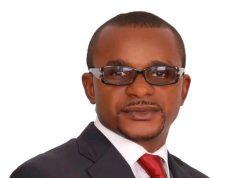
Although President Muhammadu Buhari expressed happiness over the positive GDP growth rate of 0.55 per cent recorded in the second quarter of 2017 after negative growth rates in the preceding five quarters, he yearned for a meaningful economic improvement in the lives of Nigerians. Notwithstanding the fact that the President’s wrongheaded tangle with the Niger Delta militants helped precipitate the economic recession, culpability of his economic managers for the lacklustre performance does not lessen.
The people’s economic travails have been long-drawn-out just as Buhari’s quest for power since his ouster in 1985 should have provided more than enough time for his associates and economic managers to understand the challenges arising and be prepared to remove them.
Economic outcomes are responses to policy measures being implemented. Since Buhari reportedly works largely by “body language,” his additional open expression of dissatisfaction with his associates for failing to improve the lives of Nigerians represents implicit directive for change of the self-serving mindset and wrong methods that led to the unsatisfactory results. On the other hand, since they are wont to work based on clear directives, patriotic policy implementers (these are the knowledgeable and wise public servants to whom a word is enough) should seize Buhari’s position to promptly articulate and package the appropriate methods and policies (these are already known) for achieving the desired people-imbued objectives for Mr. President to endorse and so transform his body language into policy directive.
What has become of the economic status of Nigerians under the Buhari administration? The president took office at the end of the second quarter of 2015. According to the Nigerian Gross Domestic Product Report, GDP at 2010 constant price stood at N16.5 trillion in the second quarter of 2015 and N16.3 trillion in the second quarter of 2017. The real growth rate at basic price was 2.35 per cent and 0.55 per cent respectively. During the intervening two years, there was an increase of 5.5 per cent in the population. Clearly, the corresponding quarterly GDP per capita was much higher in the second quarter of 2015 than in the second quarter of 2017. Also, we are living witnesses to the fact that income distribution skewed precipitously in favour of the few parasitic and non-productive currency traders and holders of dollar domiciliary accounts who (as if living in a foreign jurisdiction) were made exempt and stupendously rich upon devaluation of the naira that occurred before the latter quarter thereby excruciatingly swelling the ranks of the abject poor.
Without doubt (any doubting Thomases may easily access the statistical figures), similarly taking a turn for the worse during the period were the various kinds of infrastructure, the inflation rate, the unemployment rate, the absolute poverty level and the ballooning fake national domestic debt (NDD) among others. The NDD, which currently gulps 40 per cent of the federal budget, attracts double-digit interest cost. The FG owes over N2 trillion in arrears of pensions and contractors’ verified debts. In sum, the vast majority of Nigerians are extremely worse off today than before Buhari’s coming. So cheerless has been the report card of the president’s economic managers.
Besides, amidst the widespread groans of the people, it is disappointing for both chambers of the legislature to join the bandwagon of celebration of the exit from recession whereas the federal lawmakers have actually been aiding and abetting the executive arm in hamstringing the economy. For example, the Senate, acting like the outpost of foreign powers, has since the second half of 2016 refused to pass the draft law forwarded by an agency as empowered and authoritative as the Nigerian Law Reform Commission seeking to set a time limit on maintaining forex in domiciliary accounts with a view to checkmating freewheeling multiple currency practices, duly restoring the status of the naira as the national currency and so enhancing effective management of the economy.
Furthermore, the CBN governor frequently appears before the National Assembly committees, which do not deem it fit to seek explanation for CBN’s failure to abide by Sections 15, 16 and 38 of the CBN Act 2007 in order to end the persistent excess liquidity in the system. A small fraction of the excess liquidity metamorphoses into the NDD noted earlier while the remainder fuels inflation with its harmful accompaniments. It is hard to believe that the legislative committees are genuinely unaware that the set fiscal deficit limit of 3 per cent of GDP contained in the yearly Appropriation Act (AA) and the fixed AA exchange rate are intended for and should keep the naira exchange rate stable and realistic thereby not only engendering inflation range of 0-3 per cent but also guaranteeing 5-7 per cent internationally competitive lending rates (the absence of which is shamelessly cited by the executive and legislative arms for plunging the country into avoidable external debt) for the purpose of attaining the principal objects of the apex bank and enthroning conducive business environment for investors to grow the economy for the national good. It is unacceptable for the NASS to pretend not to know the import of the country’s laws pertaining to the economy.
Wonder of wonders! It took the worse than mediocre economic standing reflected in the second Quarter 2017 GDP signifying exit from recession for the media to put a face to the Economic Adviser to the President in the person of Dr. Yemi Dipeolu.
The Economic Adviser cautioned against “exogenous shocks and policy slippages.” What has he done to right the endogenous anti-economic best practice issues of multiple currency practices and the withholding of Federation Account dollar allocations only to finance the budgets of the tiers of government with substituted CBN deficit funds? Are these not the direct and remote causes of high inflation, unemployment and failure to (in his words) “achieve desired outcomes including sustained inclusive growth, further diversification of the economy, the creation of jobs and improved business conditions?” Dipeolu even sang praises of portfolio capital inflows, which according to the World Bank, do not qualify for investment qua investment. Portfolio “investors” are drainers of Nigeria’s hard earned forex (who are attracted by CBN’s baseless high interest rates paid on treasury bills and the NDD) because they earn, nay, suck in three months more interest income than is obtainable in one year in their home countries. Given proper management of the country’s forex accruals, portfolio investors will find no berth in the country.
Nigeria inherited from the military era wrong fiscal and monetary policies that undermine economic prosperity just as the military’s legacy of unitary federal system is proving increasingly unworkable. In this regard, it is pertinent to draw attention to the fact that at the height of the economic recession in September 2016, a kite was flown on the Internet under the title of “Recession: Buhari’s New Thinking.” It concluded as follows, “Economic theories and advocacy are clearly different from production and selling of goods to earn cash and provide jobs.”
With confirmation of the end of recession 28 months into a tenure of 48 months certain, is Buhari rearing to replace the 46-year long failed military fiscal and monetary policies by hatching a post-recession agenda of teaching the world his own brand of economics while using Nigeria as his testing field? Perish such thinking. The way forward for Nigeria is to discard the inherited inappropriate procedures by embracing tested and best practice economic methods responsible for the outstanding successes achieved in focused economies as this newspaper has repeatedly canvassed for more than a decade.




